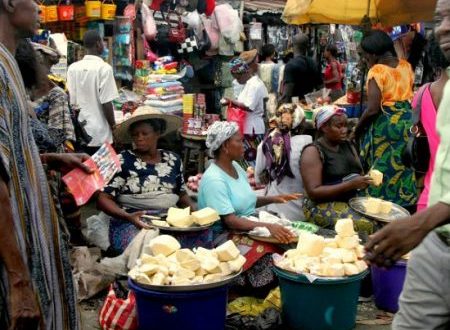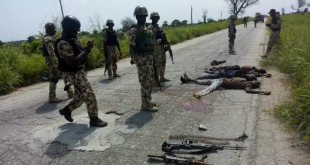Given the significant economic and security challenges facing the nation, President Bola Ahmed Tinubu and the National Assembly displayed strong energy in reverting Nigeria to its old national anthem. This decision has sparked widespread backlash among Nigerians, writes Deborah Odekola.
Many were astonished when news broke on Wednesday, May 29, 2024, that President Bola Tinubu had signed a bill reinstating the old national anthem, “Nigeria, We Hail Thee,” into law.
This was unexpected, as many anticipated a different gesture from the President, who marked one year in office on May 29, 2024.
This development followed the National Assembly’s approval of the bill after it passed through the first and second readings.
Julius Ihonvbere, representing Owan West/East Federal Constituency of Edo State, highlighted the old anthem’s significance in fostering patriotism and nationalism during discussions in the lower chamber.
But his colleague, a lawmaker from Borno, Ahmed Satomi disagreed. He raised concerns that the deliberations on the national anthem will not help to solve hunger and insecurity ravaging the country.
He said, “I don’t know how this National Anthem will affect the well-being of the common man in Nigeria. Let us be realistic, how will this help to support the government to stop hunger, banditry or improve insecurity? Let us do what is beneficial to the common man. This honourable chamber is the only formidable force for the common man. So Nigeria is looking up to us.”
The Senate Committee on Judiciary, Human Rights, and Legal Matters also held a public hearing on Monday, May 27, to address the bill’s issues.
At the hearing, the Minister of Justice and Attorney-General of the Federation, Lateef Fagbemi (SAN), advised the National Assembly against reverting to the old national anthem through legislative fiat.
A legislative fiat is a directive issued by a legislative body enacted quickly and authoritatively, often without the usual extensive consultation, debate, or stakeholder input.
Presenting the committee’s report to the Senate, Tahir Monguno, the lawmaker representing Borno North Senatorial District and chairman of the Judiciary Committee, argued, “This proposed bill is important.”
The 10th Senate passed the bill, and it was signed into law by the President within two weeks of its introduction.
Announcing the president’s approval of the anthem bill, Senate President Godswill Akpabio stated at a joint session of the Senate and House of Representatives, “The president will inaugurate the recitation of the new national anthem.” Adding that the old atthem is importance.
However, the news of the old anthem’s revival was received with mixed reactions. Concerns arose not only because some people could not recite the anthem but due to the numerous critical issues currently affecting the country.
Rather than focusing on the anthem, analysts believe that the legislature and the President should prioritize issues that directly impact the lives of ordinary Nigerians, such as the economy, insecurity, education, and other critical concerns.
Economy situation
Currently, the economic hardship in Nigeria has worsened to levels experienced during the previous administration of Muhammadu Buhari.
During Buhari’s tenure, the exchange rate of the naira to the dollar was about N460 to $1. Currently, it fluctuates between N1,339 and N1,500 to $1.
In May 2023, the Central Bank of Nigeria set the interest rate at 18.5 percent. Last week, the same CBN raised the interest rate to 26.25 percent. According to the National Bureau of Statistics, the headline inflation rate in May 2023 increased to 22.41 percent from April 2023’s rate of 22.22 percent.
By April 2024, Nigeria’s inflation rate had risen to 33.69 percent, up from 33.20 percent in March 2024, according to the NBS.
“On a year-on-year basis, the headline inflation rate was 11.47 percentage points higher compared to April 2023’s rate of 22.22 percent.”
As of June 2023, the food inflation rate in Nigeria was around 25.09 percent, according to Statista. Trading Economics reported that food prices in Nigeria surged to 40.53 percent in April 2024.
The 2023/2024 United Nations Development Programme Human Development Report highlights that Nigeria’s HDI has increased by 22 percent over 19 years but remains low at 0.548, categorizing the country as having low human development. The report notes significant HDI losses due to inequality, estimated at 32.7 percent, with persistent gender disparities.
The NBS’s 2022 Multidimensional Poverty Index survey revealed that out of 200 million Nigerians, 133 million are multidimensionally poor.
Under President Tinubu, the prices of goods and services have skyrocketed, and the poverty rate continues to rise. The country also faces unprecedented levels of insecurity and an increased crime rate.
Although Tinubu inherited many of these issues from his predecessor, analysts say it has become his government’s responsibility to address these challenges since he assumed office.
Killings and abductions spray
Under President Tinubu’s administration, no fewer than 4,556 people were killed and 7,086 abducted between May 29, 2023, and May 24, 2024, according to data from the Armed Conflict Location & Event Data Project (ACLED), a global hub for real-time conflict data. These statistics indicate a higher number of fatalities in Tinubu’s first year compared to the previous year.
ACLED data also reveals that between May 29, 2022, and May 29, 2023, 2,606 Nigerians were killed and 3,523 others were abducted.
Tinubu’s administration faced a significant security crisis just three months into his term, with the killing of 36 military personnel responding to terror threats in Niger State on August 14. On the same day, a terror group led by Dogo Gide shot down a military aircraft on a rescue mission, though the Nigerian Air Force attributed it to an accident.
In December, over 100 locals were killed in Bokkos and Mangu local government areas of Plateau State on Christmas Eve, with violence persisting through a series of attacks and reprisals.
Also, in March, armed terrorists abducted 137 elementary school students in Kuriga, Chikun LGA, Kaduna State. The students were released two weeks later after an undisclosed ransom was paid.
Additionally, in March, 15 military operatives, including two majors, one captain, and 12 soldiers from the 181 Amphibious Battalion, Nigerian Army, were killed by enraged youth in Okuama village, Ughelli South LGA, Delta State.
Tinubu’s tackling insecurity
Although the country experienced significant fatalities during the review period, the terrorists also faced heavy losses. ACLED data indicates that ongoing military operations and internal conflicts among terror groups led to approximately 4,165 terrorist casualties.
The National Security Adviser Nuhu Ribadu while discussion the government’s strategies to end the widespread violence across the country at an event recently saud the military, “is conducting numerous operations targeting insurgent groups like Boko Haram and bandits operating in Northern Nigeria.”
He emphasised that several operations have been launched to “root out insurgents and criminals from their strongholds, dismantle their networks, and restore law and order in affected areas.”
Minimum wage and Labour Union strike
The Federal Government’s ongoing dispute with these labour unions over minimum wage and other demands has successfully resulted in a nationwide strike.
The unions demanded a new minimum wage increase from N33,000 to N615,000, while the Federal Government initially offered N48,000, then N57,000, both of which were rejected by the unions.
The Tinubu administration later proposed N60,000, but the organised labour reduced their demand to N494,000, leading to a deadlock.
These stalled negotiations come just three days before the ultimatum given to the government by the labour unions to propose an acceptable living wage for workers expires.
Earlier in May, both the NLC and TUC warned that they could no longer guarantee industrial harmony if the federal government failed to agree on a living wage that reflects current economic realities by May 31, 2024.
Instead of focusing on these pressing issues to prevent an economic shutdown, lawmakers were preoccupied with debates over reverting to the old national anthem.
This is as the Labour uions on Monday commenced the nationwide strike.
All local and international airports and other sectors were grounded as other unions joined the strike.
Among them are: Nigeria Union of Petroleum and Natural Gas Workers; Amalgamated Union of Public Corporations; Civil Service Technical and Recreational Services Employees; Medical & Health Workers’ Union of Nigeria; Judiciary Staff Union of Nigeria; National Union of Electricity Employees; and National Union of Civil Engineering Construction, Furniture & Wood Workers.
Others are: Nigeria Union of Railway Workers; National Union of Banks, Insurance & Financial Institutions Employees; Association of Nigeria Aviation Professionals; Nigeria Civil Service Union; Senior Staff Association of Nigeria Universities; and Academic Staff Union of Colleges of Agriculture.
It will be recalled that members of Academic Staff Union of Universities (ASUU) had warned of imminent nationwide strike over to the Federal Government’s failure to meet lecturers demands.
Some chapters of the union also commenced processes to begin the strike.
Earlier in May, the University of Abuja chapter of ASUU declared an indefinite strike.
Also, addressing members during a meeting recently, the coordinator of the Lagos zone of ASUU, Professor Adelaja Odukoya, accused the government of ignoring their consistent appeals.
He stated that the union is rapidly losing patience over what he described as the government’s ‘insensitivity’ to the plight of its members and public universities.
According to him, the only way to avert the proposed industrial action is for the federal government to address their concerns promptly.
This came following the union’s National Executive Council (NEC) meeting held at Obafemi Awolowo University, Ile-Ife, from Saturday, May 11, to Sunday, May 12, 2024.
On May 21, lecturers at the University of Jos (UNIJOS) protested against the government’s failure to meet its demands.
They carried placards with slogans such as ‘Let ASUU members breathe,’ ‘Pay our promotion arrears,’ ‘Adequate funding of universities, is that hard?’ and ‘End ASUU strike now.’
The protest disrupted second-semester examinations, putting students at risk of another prolonged strike similar to the eight-month-long strike under Buhari that was later suspended by the union on Friday, October 14, 2022.
The union had a total of 628 days of strike during Buhari’s administration.
Analysts, Politicians react
The decision to reinstate the old national anthem has stirred significant reactions from analysts, politicians, and public figures.
Former Minister of Education, Mrs. Obiageli Ezekwesili, expressed her disapproval on her X handle, questioning the government’s priorities amidst pressing governance issues.
She added, “Wao! With all the horrible indicators of the state of governance? So, it is a new National Anthem that is their priority? I frankly thought it was a joke and gave it no attention. What an egregious case of “Majoring in the Minor” this is.”
Also, Senator Shehu Sani criticised the move, highlighting the nation’s economic and security challenges.
“Nigeria is facing serious economic and security challenges but it’s prioritising changing its national anthem. We have a bacterial infection, so we opted for Prada fragrance instead of Penicillin.”
A former aide to ex-president Goodluck Jonathan, Reno Omokri criticised the decision as unnecessary, advocating for the retention of the existing anthem written by Nigerian composers.
He emphasised the need for Indigenous representation in national symbols.
He wrote, “One of the most unnecessary acts of governance in Nigeria in recent times is the law returning the old National Anthem. First of all, there was nothing wrong with the existing anthem.
“Secondly, with all of the multifaceted issues we face, it seems like we have a lack of priorities when we major on such a settled issue as an anthem. To me, it looks like a step backward to discard the ‘Arise, O Compatriots’ National Anthem written by a collective of young Nigerians, including John A. Ilechukwu, Eme Etim Akpan, B. A. Ogunnaike, Sota Omoigui and P. O. Aderibigbe in 1978, for ‘Nigeria, We Hail Thee’, written by an English woman, Lillian Jean Williams.
“Does it not sound preposterous that a foreigner should write our National Anthem? Are we that shallow and uninspired that we cannot come up with our indigenous anthem?
“You can imagine the land of such music icons, like Fela Kuti, Osita Osadebe, Dan Maraya Jos, and contemporary stars, like Sade Adu, Burna Boy, Davido, and Wizkid, importing music of national significance from Britain.
“As my Yoruba brethren will say, ‘O wrong now!’ Already, the name Nigeria was given to us by another English lady, Flora Shaw. And she named us in 1897 in much the same way you name a dog.
“She did it tongue in cheek, for an article she wrote for The Times of London. We ought to have even changed that name to something indigenous, such as the Republic of Wazobia, as Ghana did in 1957 when she changed from Gold Coast to Ghana at Independence in 1957.”
Activist Aisha Yesufu viewed the anthem change as a distraction from more pressing issues, warning of potential draconian laws.
“It is not necessarily about the national anthem, It is about draconian, dictatorial, and obnoxious laws that can be passed while we are focused on the carnage.
“The National Anthem law is just a testing of the mic. They will keep us occupied and pass lifetime presidency law,” she stated.
Dr Joe Abah, a governance expert, questioned the government’s focus on anthem change instead of addressing critical concerns.
“Instead of debating the performance of the first year in office, they focused you on the old national anthem instead?”
Similarly, activist Charly Boy accused the government of using the anthem issue to divert attention from hunger and insecurity
He wrote, “They want to distract us from hunger, kidnapping, high cost of living by organising useless priorities for us to follow, so we won’t speak about the way we are affected.”
However, the Senior Advocate of Nigeria, Mike Ozekhome, supported the change, suggesting that the anthem alteration was long overdue and advocating for broader symbolic changes. He wrote,
“The change of the national anthem is long overdue. The name Nigeria and the flag should also be changed.”
 National Telescope national telescope newspaper
National Telescope national telescope newspaper



